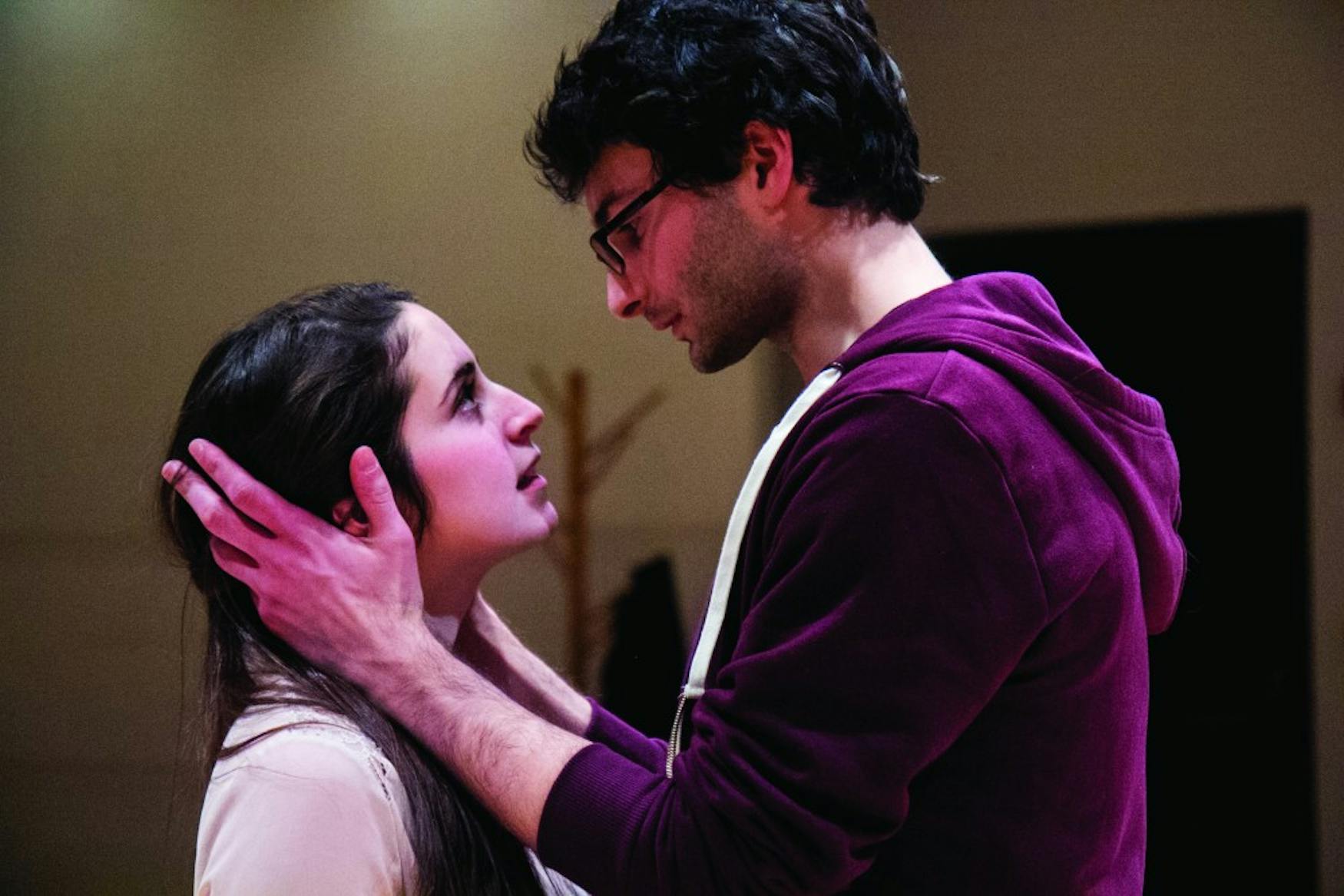Production re-imagines classic tragedy 'Romeo and Juliet'
R&J: How I Love Thy Company was a creatively condensed adaptation of William Shakespeare’s classic tragedy Romeo and Juliet. Performed in Merrick Theater in Spingold Theater Center, the show was not produced by a company but rather by one director—Zoe Golub-Sass ’15—and the cast members. The production succeeded in capturing the essence of Romeo and Juliet in just 45 minutes, with all of the roles played by only five actors.
The production cut down the original text of the play to the essential parts. In an interview with the Justice, Raphael Stigliano ’18, who played many roles, including Mercutio and Capulet, said that the idea behind shortening the play was to bring back the urgency of Romeo and Juliet’s relationship. Stigliano explained that everybody knows Romeo and Juliet and may even be tired of the story, so the goal was to remind people why the play is important and what it is really about.
To accomplish this, Golub-Sass said, in an interview with the Justice, that they chose to exclusively follow Romeo and Juliet’s experience of their own relationship and to focus on the four critical moments Romeo and Juliet share:their meeting, the balcony, their marriage and their deaths. Golub-Sass also explained how this decision influenced the title of the show—“We landed on R & J because it is a nickname for Romeo and Juliet and How I Love Thy Company (from Juliet’s line, II.ii.173) because it focuses in on the simplicity, purity and isolated quality of their relationship.”
The show started unpredictably, with the actors silently walking into the theater through the same doors that the audience was still filing in through. There was no indication, either by a darkening of lights or a typical theater voiceover that the show was about to begin. This sudden start helped to create the tense atmosphere necessary for the rest of the production and was also effective in inserting the audience right into Romeo and Juliet’s world. The opening scene immediately established the overarching feud between the Montague and Capulet families. This was crucial, because it is the strong feud between the two families that is the driving force behind Romeo and Juliet’s predicament. Due to the compressed nature of the show, Romeo and Juliet were passionately embracing and declaring their forbidden love to each other mere minutes in.
A fair amount of time during the play was spent on the well-known balcony scene. Although Merrick Theater is designed in such a way that there is an actual balcony that the actors can use, in this scene, Romeo and Juliet were staged on the main floor while members of the Capulet household and Count Paris stood up on the balcony. Stagliano commented that this was done intentionally, to keep the pair as the focus of the show (with them being eye-level with the audience) while also using the balcony to indicate the oppressive nature of the Capulets.
Unconventionally, the actors themselves dealt with the technical aspects of the production, such as controlling a set of Christmas lights and the house lights, as well as moving the props, such as a stool, into the scenes. The production creatively used the various entryways of to the theater to keep the show moving from place to place and to keep the audience extra attentive. The show relied on very few props and minimal scenery, and this scarcity highlighted the key aspects of the production. For example, in the tragic ending when Juliet wakes up just after Romeo has committed suicide because he believed Juliet to be dead, the only props used were bottles of poison.
Some of the props, such as two suit jackets, were used to cleverly transition an actor from one role to the next without their ever leaving the stage. One of these transitions occurs right after Stigliano and Caley Chase ’16 are both left dead in the swordfight between Mercutio and Tybalt. Suit jackets draped over their bodies—an action that helps emphasize their deaths—are moments later worn by the actors to help them become new characters. Romeo (Aaron Fischer ’15) and Juliet (Aliza Sotsky ’15) were the only two actors who each played just one role. Alex Davis ’15 was responsible for a whopping six roles: Friar Lawrence, the Nurse, Samson, the Prince, Benvolio and Paris. Davis, as well as Stigliano and Chase, adeptly made each character distinguishably different from the next. Fischer and Sotsky both brought an extreme level of passion to their roles that enabled the audience to understand how each could commit suicide due to the other’s death.
With a limited run of just two performances, the show was truly an innovative telling of Romeo and Juliet that brought a new energy to an old story.
Editor's Note: The headline of the article has been changed since it was first published. It was also corrected that Zoe Golub-Sass '15 was the director of the show, not the stage manager.



Please note All comments are eligible for publication in The Justice.